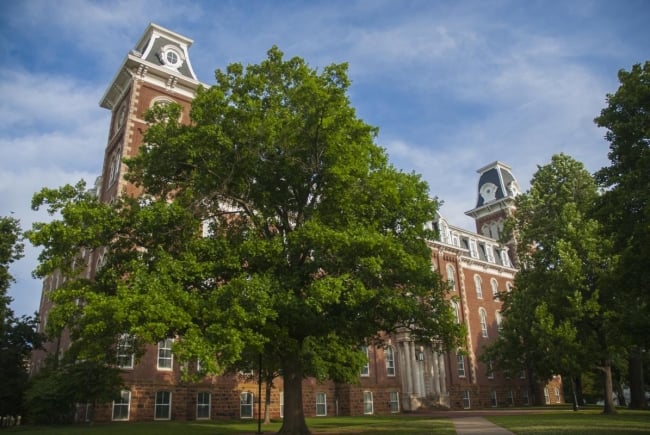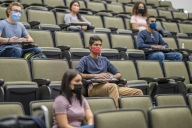You have /5 articles left.
Sign up for a free account or log in.

The University of Arkansas at Fayetteville. The Arkansas system is still evaluating the implications of President Biden’s order mandating COVID-19 vaccination for federal contractors.
BlazenImages/iStock/Getty Images Plus
A growing number of colleges and universities are mandating vaccination against COVID-19 for employees -- including undergraduate and graduate student employees -- in response to President Biden’s Sept. 9 order mandating vaccination for employees of federal contractors.
Although many hundreds of universities voluntarily implemented COVID-19 vaccine mandates for students and/or employees, colleges and universities with vaccine mandates tend to be concentrated in Democratic-leaning states. By conditioning continued receipt of federal contractor dollars on employee vaccination mandates, the Biden order stands to change this landscape and bring more parity to vaccination requirements across higher education institutions and state lines.
Even universities in deeply conservative states where state laws or executive orders prohibit COVID-19 vaccine mandates have begun to announce plans to require vaccinations of employees in response to the federal order -- although it also remains the case that many institutions located in parts of the country where vaccine mandates are politically unpalatable have held off on announcing employee vaccination requirements, saying they are continuing to study the order and their options.
Legal experts say it’s clear that under the U.S. Constitution’s Supremacy Clause a federal order would trump any potentially conflicting state or local-level laws or regulations. But public universities in many Republican-led states find themselves navigating vexed political contexts.
Many Republican-led states are suing to try to block the Biden order.
Missouri attorney general Eric Schmitt and Nebraska attorney general Doug Peterson announced Friday they are leading a 10-state lawsuit to halt the mandate. Attorneys general in Alaska, Arkansas, Iowa, Montana, New Hampshire, North Dakota, South Dakota and Wyoming joined the challenge.
The states of Florida and Texas have also filed separate lawsuits challenging the Biden executive order.
Meanwhile, time is quickly running out for employees to get vaccinated. Under the Biden order -- which does allow for employees to seek exemptions for medical or religious reasons -- employees must be fully vaccinated by Dec. 8, meaning the last day employees could receive either the single-dose Johnson & Jonson vaccine or their second dose of the Moderna or Pfizer vaccines is Nov. 24. The date to begin the two-shot Moderna vaccine series and be fully vaccinated by the Dec. 8 deadline has already passed.
A Broad Mandate With Millions of Dollars -- or More -- at Risk
The order, and associated federal guidance, are written broadly.
Under the guidance, the vaccination requirement applies to all employees who work on or "in connection with" a federal contract, including in such functions as billing, legal review or human resources. It also applies to other employees on a campus who are not working directly or indirectly on a federal contract unless the employer can "affirmatively determine" they will have no interaction with employees involved in a contract, "including interactions through use of common areas such as lobbies, security clearance areas, elevators, stairwells, meeting rooms, kitchens, dining areas, and parking garages."
Peter McDonough, vice president and general counsel for the American Council on Education, said universities are in the process of assessing whether “the only reasonable way to comply from a practical standpoint is to make the requirement applicable to all employees -- or is there some ability within their own context to thin-slice it a bit?
“I think the answer to that question is driving the differences in approaches,” McDonough said. “It strikes me that more campuses are saying the reasonable way to comply with the requirements is to apply them to all of our employees. And there are a smaller group of institutions that, it seems, are saying, ‘Let’s see if we can find some segments of our employee population or maybe some physical locations within our campuses where we can avoid the requirements.’”
McDonough said there are some legitimate questions about how the guidance, written for federal contractors broadly, is supposed to apply to college campuses specifically.
“We are out of time, and we are still needing guidance for our campuses that is specific to the higher education environment,” he said.
Meanwhile, with the deadline looming, a flurry of universities announced plans to require vaccines for employees in line with the mandate over the last week.
The University of Florida and UF Health notified employees of the requirement last week. UF Health sent an email saying that "all employees who work under the UF Health umbrella" would need to be vaccinated or obtain an approved exemption by Dec. 8. UF Research sent a separate communication stating that "all employees who directly or indirectly support federal research contracts, or are assigned to a workplace in which this work is performed, will be required to be fully vaccinated or secure an approved medical or religious exemption no later than December 8, 2021 in order to remain in their current role with no change in assignment or workplace location."
“As federal contractors, the University of Florida and UF Health are subject to the federally mandated vaccine order, and communications about the requirements of that order were shared Wednesday with the affected parties on campus,” said Steve Orlando, a UF spokesman. “The University of Florida and UF Health collectively receive over $1.6 billion in federal contracts or contract-like agreements, including Medicare/Medicaid funding. The university continues to monitor activities at the state and federal level related to the executive order.”
In Oklahoma, where state law bars public and private colleges from mandating COVID-19 vaccination as a condition of enrollment or attendance, both the University of Oklahoma and Oklahoma State University announced vaccine mandates for all employees, including student employees, Friday.
“We are obligated to adhere to the order,” OU president Joseph Harroz Jr. and Dorothy Anderson, OU’s vice president and chief human resources officer, wrote in a campuswide email. “If we do not comply, OU runs the risk of losing hundreds of millions of dollars each year in federal funding for the life-changing research, education, and services we provide.”
In Mississippi, the Board of Trustees of State Institutions of Higher Learning voted last week to amend a prior directive issued in August that largely prohibited COVID-19 vaccine mandates at Mississippi’s public colleges and universities in order to enable the institutions to comply with the Biden order.
The Mississippi board said that it “does not support mandating the vaccine, except for clinical settings. However, the Board felt it had no choice, given non-compliance with President Biden’s Executive Order could adversely affect the ability of its universities to fulfill their research mission, cause a loss of federal revenue, and result in the elimination of many highly skilled jobs for Mississippians.”
Following the board action, Mississippi State University and the University of Mississippi announced requirements for all employees to be vaccinated.
Mississippi University for Women president Nora Miller, however, said the public university would not require COVID-19 vaccination for employees, because “we do not have any federal contracts that would force us to abide by that executive order,” according to the Associated Press.
Miller said that while university administrators are encouraging vaccination, she was relieved the mandate does not apply.
“I’m afraid that we would have some employees who might leave us in some key positions,” Miller was quoted as saying.
University Actions
At least two dozen major universities or university systems have announced vaccine mandates for employees in response to the Biden order, including Arizona State, Kansas State and North Carolina State Universities; the Universities of Georgia, Minnesota and New Hampshire and the university systems of Alabama, Tennessee and Wisconsin.
Most of those institutions are requiring vaccination for all employees, but some say they will notify individual employees if they are covered by the mandate and need to be vaccinated. Pennsylvania State University has imposed a vaccine mandate for all employees at nine of its two dozen campuses.
The University of Kentucky reports that without a mandate more than 93 percent of its employees are partially or fully vaccinated. President Eli Capilouto wrote in a campuswide message Friday that the university is "in the process now of determining the exact cohort of our employees who are required to be vaccinated under the federal government’s directive and reaching out directly to them."
In Texas, where Republican governor Greg Abbott has banned vaccine mandates for all Texas entities, including private businesses, the University of Texas system is walking a thin line, with several billion dollars at stake.
“UT institutions have thousands of federal contracts in place that support a wide variety of education, research and health care activity that include our work on military projects, cybersecurity and other threats, and developing vaccines and treatments for infectious and deadly diseases,” said Karen E. Adler, a system spokeswoman. “Collectively, the contracts represent several billion dollars of investment in critical work in Texas. We will endeavor to comply with federal vaccine requirements for specific, covered individuals to protect these investments in our state. We also will ensure that exemptions are provided for those with disabilities or who decline because of religious beliefs, practices or observances, and we will make every effort to accommodate employees’ personal situations.”
A spokeswoman for Texas A&M University said administrators "are in the process of putting together the plan. A&M will comply with the law as it relates to federal contractors/employees."
Other major research universities have remained silent as to how they will handle the federal order. Among those universities systems that have not issued public announcements and did not respond to Inside Higher Ed’s queries late last week are Clemson University, Florida State University, the Montana University System and the Universities of Idaho and South Carolina.
Officials at some institutions, including the University of Missouri system and the Iowa Board of Regents -- two public systems in states that have sued to block the order -- said they are still reviewing the order and its potential impact.
A spokesman for the University of North Dakota said the university “is still considering appropriate courses of action” after the state Board of Higher Education voted Thursday to give university and system leaders flexibility in determining how to comply with the executive order.
In Arkansas, which bars government entities from requiring proof of COVID-19 vaccination as a condition for entry into buildings, a spokesperson for the University of Arkansas said the system is currently reviewing the federal order.
“We have initially estimated that roughly $120 million in current federal contracts may be subject to the requirements,” said Nate Hinkel, a University of Arkansas system spokesman. “Determining what contracts and employees are impacted will need to be considered on a contract-by-contract basis as we receive additional information from the federal agencies involved. As we continue our analysis of the federal requirements -- along with the related laws recently passed by the state Legislature -- we will be advising our campuses about how to approach each contract moving forward. While we are aware that universities in other states have issued vaccination mandates for all employees as a result of the order, we must thoughtfully consider how we proceed in light of the circumstances that are unique to Arkansas.”







